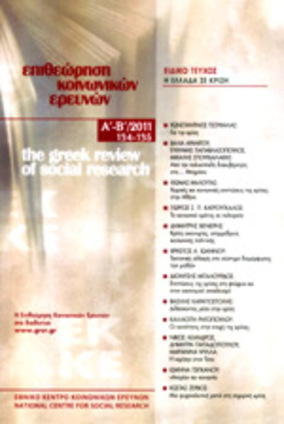Η επίλυση αριθμητικών προβλημάτων ως τόπος παράγωγης ετερότητας
Part of : Επιθεώρηση κοινωνικών ερευνών ; Vol.137/138, 2012, pages 173-200
Issue:
Pages:
173-200
Parallel Title:
Solving arithmetic problems as space for producing diversity
Section Title:
Articles
Author:
Abstract:
The present study discusses how knowledge development relates to «diversity production» within the context of solving arithmetic problems. The study focuses on analyzing the interaction amongst two Roma girls and their teacher. Problem solving is considered as a social practice in the everyday of school community and as an integral part of children's mathematical literacy. The analysis here, although based on data discussed in previous studies (see Χρονάκη, 2003• Chronaki, 2003, 2004), focuses on the mediated role played by «arithmetic» itself as part of performing and negotiating identities in the Greek school community and as part of the developing interaction amongst girls and their teacher.
Subject:
Subject (LC):
Keywords:
ετερότητες, πολυπολιτισμικότητα, διαπολιτισμική εκπαίδευση, διαμεσολαβητικές πρακτικές, ένταξη, παιδιά Ρομά, μαθηματικός γραμματισμός
Electronic Resources:
References (1):
- Γκότοβος Α., 2002, Εκπαίδευση και ετερότητα: Ζητήματα διαπολιτισμικής παιδαγωγικής, Αθήνα, Μεταίχμιο. Δαφέρμος Μ., 2006, Περιθωριοποίηση και εκπαιδευτική ένταξη: Η περίπτωση των Τσιγγάνων του Ηρακλείου Κρήτης, Ατραπός. Λυδάκη Α., 1998, Οι Τσιγγάνοι στην πόλη: Μεγαλώνοντας στην Αγία Βαρβάρα, Αθήνα, Καστανιώτης. Μηλιός Γ., 1986, Εκπαίδευση και εξουσία, Αθήνα, Θεωρία. Μπαλιμπάρ Ε., Βαλλερστάιν Ι., 1991, Φυλή, έθνος, τάξη, Αθήνα, Πολίτης. Πεχτελίδης Γ., 2012, Κυριαρχία και Αντίσταση: Μεταδομιστικές προσεγγίσεις στην εκπαίδευση, Αθήνα, Εκκρεμές. Σακονίδης Χ., 2007, «Κοινότητες πρακτικής στη μάθηση: μια αλλαγή προοπτικής για τη μαθηματική εκπαίδευση», στο Δραγώνα Θ. και Φραγκουδάκη Α. (επιμ.), Πρόσθεση όχι αφαίρεση. Πολλαπλασιασμός όχι διαίρεση, Αθήνα, Μεταίχμιο, σ. 289-326. Τσιάκαλος Γ., 1998, «Κοινωνικός αποκλεισμός, ορισμός, πλαίσιο και σημασία», στο Κ. Κασιμάτη (επιμ.), Κοινωνικός αποκλεισμός: η ελληνική εμπειρία, Αθήνα, Gutenberg. Χρονάκη Α., 2003, «Eπιχειρηματολογία και παιδιά Ρομά: το πέρασμα από τα προσωπικά βιώματα στη μαθηματική σκέψη», στο Δ. Χασάπης (επιμ.), Επιχειρηματολογία και απόδειξη στα σχολικά μαθηματικά, ΑΠΘ, σ.159-177.Abreu Guida de., 1993, The relationship between home and school mathematics in a farming community in rural Brazil, Unpublished Doctoral Dissertation, University of Cambridge, Cambridge. Αnderson B., 2006, Imagined communities: Reflections on the origin and spread of nationalism, New Edition. Apple M., 1995, «Taking power seriously: New directions in equity in mathematics education and beyond», στο W.G. Secada, E. Fennema, Adajian L.B. (eds), New directions for equity in mathematics education, Cambridge University Press, pp. 329-349. Bauchspies W., 2005, «Sharing shoes and counting years: Μathematics, colonialisation and communication», στο A. Chronaki and I. Christiansen (eds), Challenging perspectives on mathematics classroom communication, IAP press, pp. 237-260. Bourdieu P., 1977, «Cultural reproduction and social reproduction», στο J. Karabel, A. Hasley (eds), Power and ideology in education, New York, Oxford University Press, pp. 487-511. Chronaki A., 2000, «Teaching maths through theme-based resources: Pedagogic style, “theme” and “maths” in lessons», Educational Studies in Mathematics, vol. 42, pp. 141-163. Chronaki A., 2003b, «Developing mathematical learning as mastering new tools and entering new discourses: some thoughts on a very complex process», Paper presented in the symposium organised by Guida de Abreu, The social mediation of mathematical learning in multiethnic schools’ Conference of the EARLI (European Association of Research in Learning and Instruction), August 2003, Padova, Italy. Chronaki A., 2004, «Researching the school mathematics culture of “others” – creating a selfother dialogue», στο R. Zevenbergen and P. Valero (eds), Researching the socio-political dimensions of mathematics education: Issues of power in theory and methodology, Dordrecht, Kluwer Academic Publishers, pp. 145-166. Crosby Α., 1997, The measure of reality: Quantification and western society, Cambridge University Press. Freire Paulo, 2007, Pedagogy of the oppressed, New York, Continuum (new edition). Foucault M., 1975/1977, Discipline and punish, NY, Pantheon. ΕUMC. 2006, Roma and Travellers in public education. An overview of the situation in the EU member states, Vienna, EUMC. Hobsbawn E., 1968, Industry and empire, Harmondsworth, Penguin. Fairclough N., 2006, «Critical discourse analysis as a method in social scientific research», στο R. Wodak and M. Meyer (eds), Methods of critical discourse analysis, Sage Publications. Lave J., 1988, Cognition in practice: Mind, mathematics and culture in everyday life (Learning in doing), Cambridge, Cambridge University Press. Law J., 2004, After method: mess in social science research, Routledge. Lee C.D., 2005, «Cultural modelling: CHAT as a lens for understanding instructional discourse based on African American discourse patterns», στο A. Kozulin et al. (eds), Vygotsky’s educational theory in cultural context, Cambridge University Press, pp. 15-38. Liegois J.P., 1994, Roma, Tsiganes, Voyageurs, Conseil de l’ Europe. Nunes Τ., Carraher D.W., Schliemann A.D., 1993, Street mathematics and school mathematics (Learning in doing: Social, cognitive and computational perspectives), Cambridge University Press. Meyer J., Ramirez J., Soysal Y., 1992, School knowledge for the masses: World models and the national curriculum categories in the 20th century, Falmer Press.Moscovici S., 1998, «The history and actuality of social representations», στο U. Flick (ed.), The Psychology of the Social, Cambridge: CUP, pp. 209-247. Pimm D., 1995, Symbols and meanings in school mathematics, Routledge. Restivo S., 1992, Mathematics in society and history, Kluwer Academic Press. Ruthven K., 2009, «Toward a calculator aware number curriculum», Mediterranean Journal for Research in Mathematics Education, vol. 8, no 1. Saxe G., 1991, Culture and cognitive development: Studies in mathematical understanding, LEA Pubs. Secada W.G., Fennema E., Adajian L.B., 1995, New directions for equity in mathematics education, Cambridge University Press. Vygotsky L.S., 1978, Mind in sosiety: The development of higher psychological processes, Cambridge, Harvard University Press. Walkerdine V., 1988, The mastery of reason: Cognitive development and the production of rationality, London, Routledge.




